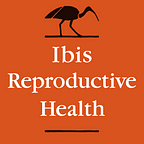The unfinished revolution: A global perspective on abortion and reproductive justice
This piece was authored by Jewelle Methazia, who is a Research Manager at Ibis Reproductive Health’s Johannesburg, South Africa office.
In a gathering transcending borders, last month, researchers from Ibis Reproductive Health joined over 300 delegates at the Abortion and Reproductive Justice Conference held at Mahidol University in Bangkok, Thailand. Under the overarching theme of “The Unfinished Revolution,” the conference brought together abortion providers, researchers, feminists, activists, youth, academics, and faith leaders from over 60 countries. The conference served as a beacon for those championing abortion rights and reproductive justice. It provided a safe and nurturing space for sharing experiences, learning, laughter, and standing in solidarity. The event was also elevated by the burst of creative expression from artists passionately advocating for abortion rights and reproductive justice through their art. Their vibrant voices added a refreshing dimension to the conference, showcasing the power of artistic advocacy.
Ibis Presentations
Ibis Reproductive Health actively contributed to the event by presenting both individually and alongside its partners in four insightful sessions. The following presentations covered a diverse range of topics crucial to advancing the global abortion and reproductive justice movement:
- “The role of hotlines and feminist accompaniment groups in training the healthcare workforce on high-quality abortion care,” which shared how feminist accompaniment groups and hotlines are at the forefront of advocating for and supporting safe abortion access in restricted settings.
- “Case studies of unplanned pregnancy and unsafe abortion among girls aged 12–17 in Gauteng, South Africa,” which shed light on critical sexual and reproductive health issues affecting younger adolescents.
- “A liberal abortion law is NOT enough to ensure access for all who need it,” which emphasized the need for political will in support of safe abortion and strengthened health systems beyond legal frameworks; and
- “From Data to Design — Using Art to breathe life into abortion research and advocacy,” which highlighted how art and research can be used to provide comprehensive information about medication abortion and combat abortion stigma.
This range of presentations underscored Ibis’s commitment to fostering partnerships and dialogue, and sharing innovative approaches in the pursuit of comprehensive reproductive healthcare and justice.
Conference Themes
The three key themes that anchored the conference — service delivery, movement building, and law and policy — served as compass points guiding the discussions toward the core issues affecting the global abortion and reproductive justice movement. These three themes were:
Service Delivery: The service delivery theme delved into the nuances of providing safe abortion care. Delegates engaged in discussions, shared best practices, and explored innovative approaches to self-care and accompaniment models. The focus was not merely on making abortion accessible, but on ensuring that the care provided is comprehensive, compassionate, and responsive to the diverse needs of individuals seeking abortion services.
Movement Building: The movement-building theme aimed to create inclusive and intersectional movements. Plenaries and breakout discussions revolved around the intersectionality of abortion and disability, towards an intersectional human rights approach. Notably, the dialogue around abortion and faith offered a reimagined perspective, with faith and reproductive organizations challenging the anti-abortion assumptions often associated with these groups.
Law and Policy: The law and policy theme aimed at completing the revolution to make abortion accessible to all who need it. Global shifts in abortion policy were scrutinized, with a focus on working collaboratively with activists, policymakers, and governments to make abortion accessible in both supportive and restrictive environments.
And two weeks after the conference, we were excited to see the news that France made history! Lawmakers voted in favour of amending the constitution to explicitly protect and guarantee the right to abortion as a human right. In doing so, France became the first country to enshrine the freedom to choose as a constitutional right. This monumental decision marked a significant milestone for reproductive rights. As France’s ground-breaking decision reverberates globally, the torch of the unfinished revolution continues to burn brightly.
